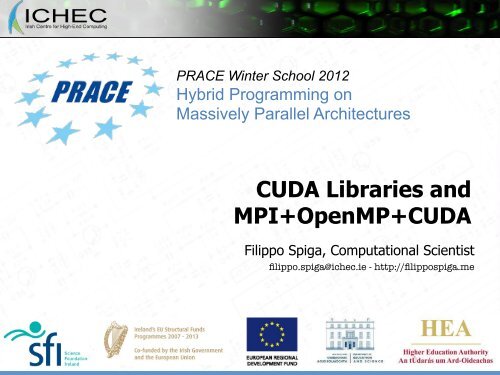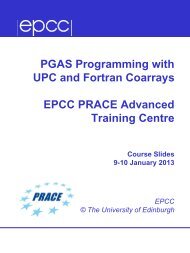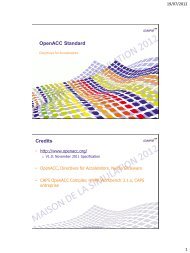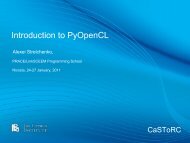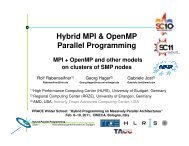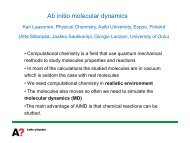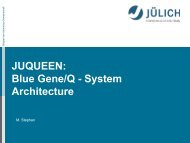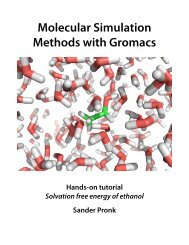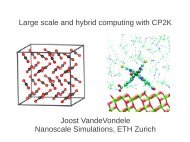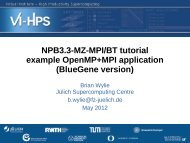CUDA Libraries and MPI+OpenMP+CUDA - Prace Training Portal
CUDA Libraries and MPI+OpenMP+CUDA - Prace Training Portal
CUDA Libraries and MPI+OpenMP+CUDA - Prace Training Portal
- No tags were found...
Create successful ePaper yourself
Turn your PDF publications into a flip-book with our unique Google optimized e-Paper software.
PRACE Winter School 2012Hybrid Programming onMassively Parallel Architectures<strong>CUDA</strong> <strong>Libraries</strong> <strong>and</strong>MPI+OpenMP+<strong>CUDA</strong>Filippo Spiga, Computational Scientistfilippo.spiga@ichec.ie - http://filippospiga.me
Outline• <strong>CUDA</strong> <strong>Libraries</strong> Ecosystem– use-case: compute 3D-FFT on multi-GPU• Mixing <strong>CUDA</strong> <strong>and</strong> FORTRAN easily• Consideration over pageable/non-pageable memory– use-case: PHIGEMM library• Performance Measurement <strong>and</strong> Metrics• Recap about <strong>CUDA</strong>+MPI• MPI+OpenMP+OpenMP: why, when, how• Use-case: GPU-accelerated Quantum ESPRESSO (PWSCF)– one-by-one kernel performance-driver analysis– consideration about overall performance, serial <strong>and</strong> parallelFebruary 10, 2012 PRACE Winter School 20122
Acknowledgments first!• ICHEC, Irish Centre for High-End Computing• Ivan Girotto, Computational Scientists - ICHEC• CINECA, Consorzio Interuniversitario• Marzia Rivi, HPC Specialist - CINECA• M. Fatica, P. Wang <strong>and</strong> C. Woolley - NVIDIA Corporation• Dhabaleswar K. (DK) P<strong>and</strong>a - Ohio State University• Rob Farber, former ICHEC Research Visitor• P. Giannozzi, L. Marsamos, C. Cavazzoni - Quantum ESPRESSO• Philip Yang, former ICHEC Summer InternFebruary 10, 2012 PRACE Winter School 20123
3 Ways to Accelerate on GPUApplication<strong>Libraries</strong>Directives(OpenACC)ProgrammingLanguagesModest, 2x ~ 10xBest, up to 100xFebruary 10, 2012 PRACE Winter School 20124
<strong>CUDA</strong> library ecosystemNVIDIA <strong>CUDA</strong>Toolkit <strong>Libraries</strong>CUBLASCUSPARSECUFFTCURANDNPPThrustmath.hsystem callsAPPLICATIONS3 rd Party <strong>Libraries</strong><strong>CUDA</strong> C<strong>CUDA</strong><strong>Libraries</strong>3 rd Party<strong>Libraries</strong>MAGMACULAlibJacketCUSPIMSL LibraryNAG*OpenVidiaOpenCurrentFebruary 10, 2012 PRACE Winter School 20125
CUFFT - Fast Fourier Transform library• Algorithms based on Cooley-Tukey (n = 2a · 3b · 5c · 7d) <strong>and</strong> Bluestein• Simple interface similar to FFTW• 1D, 2D <strong>and</strong> 3D transforms of complex <strong>and</strong> real data• Row-major order (C-order) for 2D <strong>and</strong> 3D data• Single precision (SP) <strong>and</strong> Double precision (DP) transforms• In-place <strong>and</strong> out-of-place transforms• Batch execution for doing multiple transforms• Streamed asynchronous execution• Non normalized output: IFFT(FFT(A))=len(A)*A• Major constrains for better performance (single power, length multiplies)February 10, 2012 PRACE Winter School 20126
CUFFT – Code Sample (C)#define NX 256#define NY 128cufftH<strong>and</strong>le plan;cufftComplex *idata, *odata;cudaMalloc((void**)&idata, sizeof(cufftComplex)*NX*NY);cudaMalloc((void**)&odata, sizeof(cufftComplex)*NX*NY);/* Create a 2D FFT plan. */cufftPlan2d(&plan, NX,NY, CUFFT_C2C);/* Use the CUFFT plan, transform out of place. */cufftExecC2C(plan, idata, odata, CUFFT_FORWARD);/* Inverse transform in place. */cufftExecC2C(plan, odata, odata, CUFFT_INVERSE);/* Destroy the CUFFT plan. */cufftDestroy(plan);cudaFree(idata); cudaFree(odata);February 10, 2012 PRACE Winter School 20127
CUBLAS – Basic Linear Algebra Library• Self-contained at the API level, same name convention of BLAS• Supports all the BLAS functions:– Level 1 (vector-vector, O(N) ): AXPY, DOT– Level 2 (matrix-vector, O(N 2 ) ):GEMV, TRSV– Level 3 (matrix-matrix, O(N 3 ) ): GEMM, TRSM• Following BLAS convention, column-major storage• Error h<strong>and</strong>ling• FORTRAN interfaces are Thunking <strong>and</strong> non-Thunking (default)• Support streams <strong>and</strong> asynchronous calls• Batched GEMM (small matrices)February 10, 2012 PRACE Winter School 20128
CUBLAS - Thunking versus non-ThunkingThunking:• Allows interfacing to existing applications without any changes ! wrappers• During each call, the wrappers allocate GPU memory, copy source data from CPUmemory space to GPU memory space, call CUBLAS, <strong>and</strong> finally copy back the resultsto CPU memory space <strong>and</strong> deallocate the GPGPU memory• Intended for light testing, call overheadNon-Thunking (default):• Existing applications need to be modified slightly to allocate/deallocate data the inGPGPU memory space (using CUBLAS_ALLOC <strong>and</strong> CUBLAS_FREE) <strong>and</strong> to copydata between GPU <strong>and</strong> CPU memory spaces (using CUBLAS_SET_VECTOR,CUBLAS_GET_VECTOR, CUBLAS_SET_MATRIX, <strong>and</strong> CUBLAS_GET_MATRIX)• Intended for production code, high flexibilityFebruary 10, 2012 PRACE Winter School 20129
CUBLAS – Code Sample (FORTRAN)PROGRAM example_sgemm! Define 3 single precision matrices A, B, CREAL, dimension(:,:), allocatable:: A(:,:), B(:,:), C(:,:)INTEGER :: n = 100ALLOCATE(A(n,n), B(n,n), C(n,n))! Initialize A, B <strong>and</strong> C...! Call SGEMM in CUBLAS library using THUNKING interface (library takes care of! memory allocation on device <strong>and</strong> data movement)CALL cublas_SGEMM('n','n', n,n,n,1.,A,n,B,n,1.,C,n)! De-allocate A, B <strong>and</strong> C...END PROGRAM example_sgemmThunkingFebruary 10, 2012 PRACE Winter School 201210
CUBLAS – Code Sample (FORTRAN)PROGRAM example_sgemmREAL, dimension(:,:), allocatable:: A(:,:),B(:,:),C(:,:)INTEGER*8 :: devPtrA, devPtrB, devPtrCINTEGER:: n=16, size_of_real=16! AllocateALLOCATE(A(n,n),B(n,n),C(n,n))CALL cublas_Alloc(n*n,size_of_real, devPtrA)…! Copy data to GPUCALL cublas_Set_Matrix(n,n,size_of_real,A,n,devPtrA,n)…! Call SGEMM in CUBLAS libraryCALL cublas_SGEMM('n','n', n,n,n,1.,devPtrA,n,devPtrB,n,1.,devPtrC,n)! Copy data from GPU callCALL cublas_Get_Matrix(n,n,size_of_real,devPtrC,n,C,n)! DeallocateCALL cublas_Free(devPtrA)…END PROGRAM example_sgemmNon-ThunkingFebruary 10, 2012 PRACE Winter School 201211
Thrust• A template library for <strong>CUDA</strong> — Mimics the C++ STL• Containers: manage memory on host <strong>and</strong> device:thrust::host_vector, thrust:device_vector• Define ranges: d_vec.begin(), support Iterators• Hides/Simplify data movement: know where data lives• Algorithms acting on ranges <strong>and</strong> support general types <strong>and</strong>operators:– Element-wise operations: for_each, transform, gather, scatter,...– Reduction: reduce, inner_product, reduce_by_key, ...– Prefix-Sums: inclusive_scan, inclusive_scan_by_key, ...– Sorting: sort, stable_sort, sort_by_keyFebruary 10, 2012 PRACE Winter School 201212
use-case: compute 3D-FFT on multi-GPUExample inside the book “<strong>CUDA</strong> Application Design <strong>and</strong> Development” (Rob Farber)GOAL:• batch multiple 3D-FFT across multiple GPU in the same host/workstation• Measure the time spent for computation <strong>and</strong> data transfer through profiling(is there overlapping?)DESIGN:• C++ & Templates• Thrust for data manipulation (we do not focus on it)• Multi-plan cuFFT wrapped in a separate C++ classFebruary 10, 2012 PRACE Winter School 201213
fft3Dtest.cu – Code Snippet (C++)cudaStream_t streams[nGPU];for(int sid=0; sid < nGPU; sid++) {cudaSetDevice(sid);if(cudaStreamCreate(&streams[sid]) != 0) {cerr
fft3Dtest.cu – Code Snippet (C++)long h_offset=0;for(int i=0; i < totalFFT; i += nGPU*nPerCall) {for(int j=0; j < nGPU; j++) {cudaSetDevice(j);cudaMemcpyAsync(d_data[j], ((char*)h_data)+h_offset,bytesPerGPU, cudaMemcpyDefault,streams[j]);cforwardFFT_(fftPlanMany[j],d_data[j], d_data[j]);cinverseFFT_(fftPlanMany[j],d_data[j], d_data[j]);}}cudaMemcpyAsync(((char*)h_data)+h_offset, d_data[j],bytesPerGPU, cudaMemcpyDefault,streams[j]);h_offset += bytesPerGPU;cudaDeviceSynchronize();cudaSetDevice(0);Courtesy of R. FarberFebruary 10, 2012 PRACE Winter School 201215
fft3Dtest.cu - ProfilingCourtesy of R. FarberFebruary 10, 2012 PRACE Winter School 201216
fft3Dtest.cu - Profiling12101 GPU2 GPU4 GPU3D-FFT on multpile GPU3D-FFT on multpile GPU vs single-core FFTWCPU1 GPU2 GPU4 GPUTime [s]864Time [s]10 210 1204096 x 64 3 512 x 128 3 64 x 256 3Number of GPUs10 010 3 4096 x 64 3 512 x 128 3 64 x 256 3Number of GPUsCourtesy of R. FarberFebruary 10, 2012 PRACE Winter School 201217
Mixing <strong>CUDA</strong> <strong>and</strong> FORTRANQ: Can I call <strong>CUDA</strong> library routines directly in a FORTRAN program?A: Yes but keep in mind the data order convention!Q: Can I wrote a <strong>CUDA</strong> kernel in FORTRAN?A: No… but <strong>CUDA</strong> Fortran exists (PGI)Q: Can I call <strong>CUDA</strong> runtime APIs in FORTRAN?A: Yes <strong>and</strong> No… but <strong>CUDA</strong> Fortran exists (PGI)Q: So, how I can perform a simple pinned allocation of in FORTRAN?A: …February 10, 2012 PRACE Winter School 201218
Pinned allocation - Code Sample (FORTRAN)MODULE cuda_mem_allocINTERFACE! cudaMallocHostINTEGER (C_INT) function cudaHostAlloc(buffer, size, flag) &bind(C,name="cudaHostAlloc")MODULE iso_c_bindingIMPLITICT NONETYPE(C_PTR) :: bufferINTEGER(C_SIZE_T), VALUE :: sizeINTEGER(C_SIZE_T), VALUE :: flagEND FUNCTION cudaHostAlloc! cudaFreeHostINTEGER (C_INT) function cudaFreeHost(buffer) bind(C,name="cudaFreeHost")MODULE iso_c_bindingIMPLITICT NONETYPE(C_PTR), VALUE :: bufferEND FUNCTION cudaFreeHostEND INTERFACEEND MODULE cuda_mem_allocFebruary 10, 2012 PRACE Winter School 201219
Pinned allocation - Code Sample (FORTRAN)#define N 1000#define M 1000USE iso_c_bindingUSE cuda_mem_allocINTEGER, PARAMETER :: singlePrecision = kind(0.0)INTEGER, PARAMETER :: fp_kind_single = singlePrecisionINTEGER, PARAMETER :: doublePrecision = kind(0.0d0)INTEGER, PARAMETER :: fp_kind_double = doublePrecisionINTEGER :: resINTEGER (C_SIZE_T), PARAMETER :: test_flag = 0INTEGER (C_SIZE_T) :: allocation_sizeFebruary 10, 2012 PRACE Winter School 201220
Pinned allocation - Code Sample (FORTRAN)REAL(fp_kind_single), dimension(:,:), pointer :: h_A ! REALREAL(fp_kind_double), dimension(:,:), pointer :: h_B ! REAL DOUBLE PRECISIONREAL(fp_kind_single), dimension(:,:), pointer :: h_C ! COMPLEXREAL(fp_kind_double), dimension(:,:), pointer :: h_D ! COMPLEX DOUBLE PRECISIONTYPE(C_PTR) :: cptr_A, cptr_B, cptr_C, cptr_Dallocation_size = M*N*SIZEOF(fp_kind_single)res = cudaHostAlloc (cptr_A, allocation_size, test_flag )CALL c_f_pointer ( cptr_A, h_A, (/ M, N/) )allocation_size = M*N*SIZEOF(fp_kind_double)*2res = cudaHostAlloc (cptr_D, allocation_size, test_flag )CALL c_f_pointer ( cptr_D, h_D, (/ M, N/)! Deallocate properlyres = cudaFreeHost( cptr_A )res = cudaFreeHost( cptr_D )February 10, 2012 PRACE Winter School 201221
Consideration over PINNED memoryPINNED (or non-pageable) memory is a memory allocated on the host that…• allows asynchronous data transfers (no CPU needed, DMA works alone);• allows overlapping COMPUTATION/COMPUTATION on the same stream;• since it is page-locked, the SO cannot move it;• if you do not de-allocate it, never disappears*;• if you allocate it too much (how much?), the overall performance of the system isaffected.Note: you can probe if a host memory is pinned or not (cudaHostGetFlags)…Note: if you code involves MPI communication is better to exploit GPU Directfeatures <strong>and</strong> avoid multiple pinned allocations at host level required toexchange “data on host memory” between the GPU <strong>and</strong> the IB driver…February 10, 2012 PRACE Winter School 201222
Consideration over PINNED memory4m35.05sNO MPIhere!4m23.05sFebruary 10, 2012 PRACE Winter School 201223
use-case: PHIGEMMWithout PINNEDGPUCPUIH2DD2HWith PINNEDGPUH2DD2HCPUIFebruary 10, 2012 PRACE Winter School 201224
PHIGEMM – Code Snippet (C)for (iDev = 0; iDev < phiGemmNumDevices * NSTREAMS; iDev++) {cudaSetDevice(deviceIds[iDev % phiGemmNumDevices]);for (j = 0; j < 6; j++)devPtrA[iDev]=(double *)(dev_scratch[iDev]);…if ( is_transa ) {status = cublasSetMatrixAsync (k_h2d[iDev], m_h2d[iDev],sizeof(double), A+shiftA, *lda, devPtrA[iDev],k_gpu[iDev], phiStreams[iDev]);shiftA += m_h2d[iDev] * (*lda);} else {status = cublasSetMatrixAsync (m_h2d[iDev], k_h2d[iDev],sizeof(double), A+shiftA, *lda, devPtrA[iDev],m_gpu[iDev], phiStreams[iDev]);shiftA += m_h2d[iDev];}February 10, 2012 PRACE Winter School 201225
use-case: PHIGEMMGFlopsphiGEMM single- <strong>and</strong> multi-GPU performance80070060050040030020010001024 2048 3072 4096 5120 6144 7168 8192 9216 10240Dimension [M=N=K]CUBLAS ThunkingCUBLAS peakMKLphiGEMM (1 GPU)phiGEMM (2 GPU)February 10, 2012 PRACE Winter School 201227
cuBLAS API: new versus Legacy• the h<strong>and</strong>le to the CUBLAS library context is initialized using thecublasCreate(…) function <strong>and</strong> it is explicitly passed to every subsequentlibrary function call.– more control over the library setup when using multiple host threads <strong>and</strong>multiple GPUs.• the scalars <strong>and</strong> can be passed by reference on the host or the device,instead of only being allowed to be passed by value on the host.– library functions can be executed asynchronously using streams even when <strong>and</strong> are generated by a previous kernel;– same for the scalar value output.What change? (cublas.h ! cublas_v2.h) + new parameter in the call (h<strong>and</strong>ler)February 10, 2012 PRACE Winter School 201228
Performance Measurement <strong>and</strong> Metrics• Objective: find out the limiting factor in kernel performance– Memory b<strong>and</strong>width bound– Instruction throughput bound (compute)– Latency bound– Combination of the above• Address the limiters in order of importance– Determine how close to the HW limits the resource is being used– Apply optimizations (not in this presentation)• Inspection/Investigation– Automatically by the Visual Profile– Manually (just few hints)• Typically an iterative processFebruary 10, 2012 PRACE Winter School 201229
Performance Measurement <strong>and</strong> MetricsVisual Profiler…• reports data by SM (with exception of L2 <strong>and</strong> DRAM counters)• needs more executions to collect everything (so… it is a bit slow)– REMEMBER: blocks <strong>and</strong> warps are scheduled at run-time!• to compute derivated statistics automatically you need it (<strong>and</strong> X)Manually inspection…• Re-code your kernel to obtain 3 versions…– a base kernel which performs the desired overall operation (T);– a memory kernel which has the same device memory access patterns as thebase kernel but no math operations (M);– a math kernel which performs the math operations of the base kernel withoutaccessing global memory (O).• Run <strong>and</strong> evaluate the gputime (be smart ! <strong>CUDA</strong> event)February 10, 2012 PRACE Winter School 201230
Performance Measurement <strong>and</strong> MetricsO M T O M T O M T O M TCompute-bound Memory-bound Balanced(limited latency)Latency issuesFebruary 10, 2012 PRACE Winter School 201231
Performance Measurement <strong>and</strong> Metrics__global__ base(float *a, float *b) {int i;i = (blockIdx.x-1)*blockDim.x + threadIdx.x;a[i] = sin(b[i]);}__global__ memory(float *a, float *b) {int i;i = (blockIdx.-1)*blockDim.x + threadIdx.x;a[i] = b[i];}__global__ math(float *a, float b, int flag) {float v;int i;i = (blockIdx.-1)*blockDim.x + threadIdx.xv = sin(b);if (v*flag == 1) a[i] = v;}Smart trick to avoid compilerinterference at assembly levelCourtesy of M. FaticaFebruary 10, 2012 PRACE Winter School 201232
Performance Measurement <strong>and</strong> MetricsOutput of the comm<strong>and</strong>-line profiler (export <strong>CUDA</strong>_PROFILE=1)method=[ base ] gputime=[ 871.680 ] cputime=[ 5.000 ] occupancy=[ 1.000 ]method=[ memory ] gputime=[ 620.064 ] cputime=[ 5.000 ] occupancy=[ 1.000 ]method=[ math ] gputime=[ 661.792 ] cputime=[ 5.000 ] occupancy=[ 1.000 ]! Kernel balanced, latency under controlCan we do better? Yes! sin() ! __sin()method=[ base ] gputime=[ 626.944 ] cputime=[ 5.000 ] occupancy=[ 1.000 ]method=[ memory ] gputime=[ 619.328 ] cputime=[ 4.000 ] occupancy=[ 1.000 ]method=[ math ] gputime=[ 163.136 ] cputime=[ 5.000 ] occupancy=[ 1.000 ]! Kernel memory-boundCourtesy of M. FaticaFebruary 10, 2012 PRACE Winter School 201233
MPI + <strong>CUDA</strong>, short summary1MPI communication <strong>and</strong> <strong>CUDA</strong> data transfer (D2H,H2D, D2D) entirely h<strong>and</strong>led by the programmer in anindependent <strong>and</strong> monolithic way2MPI communication <strong>and</strong> <strong>CUDA</strong> data transfer(D2H, H2D, D2D) entirely h<strong>and</strong>led by theprogrammer in an independent <strong>and</strong> smart way3Use a MPI library that is aware of <strong>CUDA</strong> <strong>and</strong> able totake care by itself of all data movements betweenHOST <strong>and</strong> DEVICE (D2H, H2D, D2D?)February 10, 2012 PRACE Winter School 201234
MPI + OpenMP + <strong>CUDA</strong> = what?MPI• Many HPC applications are adoptingMPI+OpenMP nowadays• We still need accelerationGet shorter the time-to-solutionOpenMP<strong>CUDA</strong>Take the positive of all models• MPI: domain decomposition• OpenMP: external big loops• <strong>CUDA</strong>: computational-intensive innerloops <strong>and</strong> string FP throughputFebruary 10, 2012 PRACE Winter School 201235
Know what you have…Let’s forget about <strong>CUDA</strong> 3.x <strong>and</strong> “old” GPU devices…Facts:• OpenMP <strong>and</strong> <strong>CUDA</strong> target local computations• MPI moves data (where is the data, HOST or DEVICE, is not conceptually soimportant) … <strong>and</strong> nothing else.• All modern compilers are OpenMP compatible (al least for OpenMP v2.5)• With <strong>CUDA</strong> 4.x it is now easier to manage multiple devices <strong>and</strong> toasynchronously off-load computation• Current hybrid HW “forces” people to think about complex computations likea set of tasks with dependency that can be dispatch to the bestcomputational device/unit available*February 10, 2012 PRACE Winter School 201236
… <strong>and</strong> maximize it!How? Keep in mind that…• We live in a hybrid multi-core world– Cores per socket >= 4– Socket per node >= 2– GPU (or other accelerator) per node >=2• Current MPI+OpenMP codes (95%?) usually implement master-onlyor funneled hybrid strategies– When a MPI process communicates to another MPI process, othercompute units are idle ! overlapping?• GPU computation is not-driven by the CPU– When GPU computes, CPU cores are free (<strong>and</strong> vice-versa) !overlapping?Challenging? Yes!But not impossible.• Algorithms implement task that might be independent each other– Let’s the proper compute unit (CPU or GPU) do what is better for itFebruary 10, 2012 PRACE Winter School 201237
Example: PLASMA, DPLASMA & MAGMAMAGMA uses HYBRIDIZATION methodologybased on• Representing linear algebra algorithms ascollections of TASKS <strong>and</strong> DATADEPENDENCIES among them• Properly SCHEDULING the tasks' executionover the multicore <strong>and</strong> the GPU hardwarecomponentsWhat does HYBRIDIZATION means?• Panels (Level 2 BLAS) are factored on CPUusing LAPACK• Trailing matrix updates (Level 3 BLAS) aredone on the GPU using “look-ahead”February 10, 2012 PRACE Winter School 201238
QUANTUM ESPRESSO in a nutshell• QUANTUM ESPRESSO is an integrated suite of computer codes for electronicstructurecalculations <strong>and</strong> materials modeling at the nanoscale.– Density-Functional Theory, plane waves, pseudo-potential, …• It can run in parallel on several HPC architectures– Linux clusters, CRAY supercomputers, IBM Power & BlueGene, NEC, …• It supports MPI <strong>and</strong> OpenMP for a high scalable parallel implementation• It systematically uses st<strong>and</strong>ardized mathematical libraries– BLAS, LAPACK, FFTW, …• Two main packages: PWSCF <strong>and</strong> CPFebruary 10, 2012 PRACE Winter School 201239
Time-consuming steps in PWSCF• Calculation of Charge Density– FFT + matrix-matrix multiplication• Calculation of Potential– FFT + operations on real-space grid• Davidson Iterative Diagonalization (SCF)– FFT + eigenvalues/eigenvectors problem + matrix-matrix multiplicationBasically most CPU time spent in linear-algebra operations,implemented in BLAS <strong>and</strong> LAPACK libraries, <strong>and</strong> in FFT!February 10, 2012 PRACE Winter School 201240
Parallelization levels in PWSCFImages• Only for Nudged Elastic B<strong>and</strong> (NEB) calculationsGPU!K-pointsPlane-wavesLinear algebra &task groupsMulti-threadedkernels• Distribution over k-points (if more than one)• Scalability over k-points (if more than one)• No memory scaling• Distribution of wave-function coefficients• Distribution of real-grid points• Good memory scale, good overall scalability, LB• Iterative diagonalization (fully-parallel or serial)• Smart grouping of 3DFFTs to reduce compulsoryMPI communications• OpenMP h<strong>and</strong>led explicitly or implicitly• Extend the scaling on multi-core machines with“limited” memoryFebruary 10, 2012 PRACE Winter School 201241
GPU Developments• MPI-GPU binding & GPU memory management• NEWD ! <strong>CUDA</strong> NEWD (multiple kernels combined)• ADDUSDENS ! <strong>CUDA</strong> ADDUSDENS• VLOC_PSI ! <strong>CUDA</strong> VLOC_PSI (<strong>CUDA</strong> kernels + CUFFT)• BLAS 3 *GEMM ! PHIGEMM library• (serial) LAPACK ! MAGMA libraryVLOC_PSI acts over distributed dataNEWD/ADDUSDENS act over local dataFebruary 10, 2012 PRACE Winter School 201242
MPI-GPU binding & GPU memory managementNEVER allocated 100% !!!Pointer to <strong>CUDA</strong> memory(MPI process sub-rank 0)Pointer to <strong>CUDA</strong> memory(MPI process sub-rank 0)Pointer to <strong>CUDA</strong> memory(MPI process sub-rank 1)NOTE 1: PWscf keeps track of how much GPU memory is availableNOTE 2: any process can access the memory allocated to another process in the card!!!February 10, 2012 PRACE Winter School 201243
MPI-GPU binding – Code Snippet (C)/* What is my name? */MPI_Get_processor_name(lNodeName, &lNodeNameLength);/* Collecting all names... */lNodeNameRbuf = (char*) malloc(lSize * MPI_MAX_PROCESSOR_NAME * sizeof(char));MPI_Allgather(lNodeName, MPI_MAX_PROCESSOR_NAME, MPI_CHAR, lNodeNameRbuf,MPI_MAX_PROCESSOR_NAME, MPI_CHAR, MPI_COMM_WORLD);/* lRanksThisNode is a list of the global ranks running on this node */lRanksThisNode = (int*) malloc(lSize * sizeof(int));for(i = 0; i < lSize; i++) {if(strncmp(lNodeName, (lNodeNameRbuf + i * MPI_MAX_PROCESSOR_NAME),MPI_MAX_PROCESSOR_NAME) == 0) {lRanksThisNode[lNumRanksThisNode] = i;lNumRanksThisNode++;}}February 10, 2012 PRACE Winter School 201244
MPI-GPU binding – Code Snippet (C)/* Create a communicator consisting of the ranks running on this node. */MPI_Comm_group(MPI_COMM_WORLD, &lWorldGroup);MPI_Group_incl(lWorldGroup, lNumRanksThisNode, lRanksThisNode, &lThisNodeGroup);MPI_Comm_create(MPI_COMM_WORLD, lThisNodeGroup, &lThisNodeComm);MPI_Comm_rank(lThisNodeComm, &lRankThisNode);MPI_Comm_size(lThisNodeComm, &lSizeThisNode);/* Attach all MPI processes on this node to the available* GPUs in round-robin fashion*/cudaGetDeviceCount(&lNumDevicesThisNode);/* Multiple MPI can share a GPU... */for (i = 0; i < ngpus_per_process; i++) {qe_gpu_bonded[i] = lRankThisNode % lNumDevicesThisNode;}February 10, 2012 PRACE Winter School 201245
GPU memory management – Code Snippet (C)/* Loop over GPU per process (serial >= 1, parallel always 1) */for (i = 0; i < ngpus_per_process; i++) {/* Set active GPU device */if ( cudaSetDevice(qe_gpu_bonded[i]) != cudaSuccess) MPI_Abort(...);ierr = cudaMalloc ( (void**) &(dev_scratch_QE[i]), 0);if ( ierr != cudaSuccess) MPI_Abort(...);/* Query the real free memory, taking into account the "stack" */cuMemGetInfo(&free, &total);cuda_memory_allocated[i] = (size_t)(free * __SCALING_MEM_FACTOR__ / procs_per_gpu);}ierr = cudaMalloc ( (void**) &(dev_scratch_QE[i]), (size_t)cuda_memory_allocated[i] );if ( ierr != cudaSuccess) MPI_Abort(...);February 10, 2012 PRACE Winter School 201246
MPI/Process-GPU scenariosSingle GPU per MPI/ProcessMultiple GPU per MPI/ProcessPARALLELSERIALFebruary 10, 2012 PRACE Winter School 201247
ADDUSDENS – Code Snippet (FORTRAN)DO ih = 1, nh (nt)DO jh = ih, nh (nt)CALL qvan2 (ngm, ih, jh, nt, qmod, qgm, ylmk0)ijh = ijh + 1DO na = 1, natIF ( ityp(na) .eq. nt) THENDO is = 1, nspin_magDO ig = 1, ngmskk = eigts1 (mill (1,ig), na) * &eigts2 (mill (2,ig), na) * &eigts3 (mill (3,ig), na)aux(ig,is) = aux(ig,is) + qgm(ig)*skk*becsum(ijh,na,is)ENDDOENDDOENDIFENDDOENDDOENDDOFebruary 10, 2012 PRACE Winter School 201248
<strong>CUDA</strong> ADDUSDENS – Code Snippet (C)for( ih = 0, iih = 1; ih < nh[nt - 1]; ih++, iih++) {for( jh = ih, jjh = iih; jh < nh[nt - 1]; jh++, jjh++, ijh++ ) {qvan2_(ptr_ngm, &iih, &jjh, ptr_nt, qmod, qgm, ylmk0);/* Protective guard */cudaDeviceSynchronize();qecudaSafeCall(cudaMemcpy( qgm_D, qgm, sizeof( double ) * ngm * 2, cudaMemcpyHostToDevice ));}}kernel_compute_aux( eigts1_D, eigts2_D, eigts3_D, ig1_D,ig2_D, ig3_D, nr1, nr2, nr3, qgm_D, becsum_D, aux_D, na, nspin_mag, ngm,first_becsum, ijh, nat, ityp_D, nt );qecudaGetLastError("kernel launch failure");qecudaSafeCall( cudaMemcpy( aux, aux_D, sizeof( double ) * ( ngm * nspin_mag * 2 ),cudaMemcpyDeviceToHost ) );February 10, 2012 PRACE Winter School 201249
QVAN2 – Code Snippet (FORTRAN)DO lm = 1, lpx (ivl, jvl)lp = lpl (ivl, jvl, lm)IF ( lp < 1 .or. lp > 49 ) CALL errore (... )...! find angular momentum l corresponding to combined index lpIF (lp == 1) THEN...ELSEIF ( lp
<strong>CUDA</strong> ADDUSDENS – Code Snippet (C)qecudaSafeCall( cudaMemcpy( ig1_D, ig1, sizeof( int ) * ngm,cudaMemcpyHostToDevice ) );...qecudaSafeCall( cudaMemcpy( eigts1_D, eigts1,sizeof( double ) * (((nr1*2 + 1)*nat)*2), cudaMemcpyHostToDevice ) );...qecudaSafeCall( cudaMemcpy( aux_D, aux,sizeof( double ) * (ngm*nspin_mag*2), cudaMemcpyHostToDevice ) );...dim3 threads2(1, __<strong>CUDA</strong>_TxB_ADDUSDENS_COMPUTE_AUX__);dim3 grid2( nspin_mag / 1 ? nspin_mag / 1 : 1,(ngm+__<strong>CUDA</strong>_TxB_ADDUSDENS_COMPUTE_AUX__-1)/__<strong>CUDA</strong>_TxB_ADDUSDENS_COMPUTE_AUX__?(ngm+__<strong>CUDA</strong>_TxB_ADDUSDENS_COMPUTE_AUX__-1)/__<strong>CUDA</strong>_TxB_ADDUSDENS_COMPUTE_AUX__:1);qecudaSafeCall( cudaFuncSetCacheConfig(kernel_compute_aux,cudaFuncCachePreferShared) );February 10, 2012 PRACE Winter School 201251
<strong>CUDA</strong> ADDUSDENS, Considerations• <strong>CUDA</strong> kernel is mainly compute-boundedptxas info : Compiling entry function'_Z18kernel_compute_auxPKdS0_S0_PKiS2_S2_iiiS0_S0_PdiiiiiiS2_i' for 'sm_20'ptxas info : Function properties for _Z18kernel_compute_auxPKdS0_S0_PKiS2_S2_iiiS0_S0_PdiiiiiiS2_i0 bytes stack frame, 0 bytes spill stores, 0 bytes spill loadsptxas info : Used 31 registers, 4096+0 bytes smem, 156 bytes cmem[0]– 1024 threads per block ! OCCUPANCY = 0.66/0.67– Memory throughput is really low! (6.73/144 GBs)– It uses shared memory (SHARED/L1 as 48/16 or 16/48?)• QVAN2 (OpenMP) <strong>and</strong> KERNEL_COMPUTE_AUX (<strong>CUDA</strong>) can overlap• Best performance measured: 20x (Realistic? Yes*)Q: Can be further optimized ??February 10, 2012 PRACE Winter School 201252
ADDUSDENS – Code Snippet (FORTRAN)DO ih = 1, nh (nt)DO jh = ih, nh (nt)CALL qvan2 (ngm, ih, jh, nt, qmod, qgm, ylmk0)ijh = ijh + 1DO na = 1, natIF ( ityp(na) .eq. nt) THEN!$OMP PARALLEL DO DEFAULT(SHARED) PRIVATE(is, skk, ig)DO ig = 1, ngmskk = eigts1 (mill (1,ig), na) * &eigts2 (mill (2,ig), na) * &eigts3 (mill (3,ig), na)DO is = 1, nspin_magaux(ig,is) = aux(ig,is) + qgm(ig)*skk*becsum(ijh,na,is)ENDDOENDDO!$OMP END PARALLEL DOENDIFENDDO...February 10, 2012 PRACE Winter School 201253
“new” <strong>CUDA</strong> ADDUSDENS – Code Snippet (C)cudaStream_t stream[QE_NUM_SUPPORTED_STREAMS];cudaStreamCreate(&stream[0]);for( ih = 0, iih = 1; ih < nh[nt - 1]; ih++, iih++) {for( jh = ih, jjh = iih; jh < nh[nt - 1]; jh++, jjh++, ijh++ ) {qvan2_(ptr_ngm, &iih, &jjh, ptr_nt, qmod, qgm, ylmk0);cudaStreamSynchronize(stream[0]);cudaMemcpyAsync (qgm_D, qgm,sizeof( double ) * ngm * 2, cudaMemcpyHostToDevice, stream[0]);}}kernel_compute_aux( eigts1_D, eigts2_D,eigts3_D, ig1_D, ig2_D, ig3_D, nr1, nr2, nr3, qgm_D, becsum_D, aux_D, na,nspin_mag, ngm, first_becsum, ijh, nat, ityp_D, nt );// cudaStreamQuery()February 10, 2012 PRACE Winter School 201254
ADDUSDENS – Code Snippet (FORTRAN)DO ih = 1, nh (nt)DO jh = ih, nh (nt)CALL qvan2 (ngm, ih, jh, nt, qmod, qgm, ylmk0)ijh = ijh + 1DO na = 1, natIF ( ityp(na) .eq. nt) THEN!$OMP PARALLEL DO DEFAULT(SHARED) PRIVATE(is, skk, ig)DO ig = 1, ngmskk = eigts1 (mill (1,ig), na) * &eigts2 (mill (2,ig), na) * &eigts3 (mill (3,ig), na)DO is = 1, nspin_magaux(ig,is) = aux(ig,is) + qgm(ig)*skk*becsum(ijh,na,is)ENDDOENDDO!$OMP END PARALLEL DOENDIFENDDO...February 10, 2012 PRACE Winter School 201255
<strong>CUDA</strong> NEWD – Code Snippet (C)for( ih = 0, iih = 1; ih < nh[nt - 1]; ih++, iih++ ) {for( jh = ih, jjh = iih; jh < nh[nt - 1]; jh++, jjh++ ) {qvan2_(ptr_ngm, &iih, &jjh, ptr_nt, qmod, qgm, ylmk0);qecudaSafeCall( cudaMemcpy( qgm_D, qgm,sizeof( double ) * ngm * 2, cudaMemcpyHostToDevice ) );for( na = 0; na < nat; na++ ){if( ityp[na] == nt ) {blocksPerGrid = ( (nspin_mag * ngm * 2 ) + 256 - 1) / 256;kernel_compute_qgm_na(eigts1_D, eigts2_D, eigts3_D, ig1_D, ig2_D, ig3_D,qgm_D, nr1, nr2, nr3, na, ngm, qgm_na_D );qecudaGetLastError("kernel launch failure");...February 10, 2012 PRACE Winter School 201256
<strong>CUDA</strong> NEWD – Code Snippet (C)cublasSetPointerMode(vlocH<strong>and</strong>les[0] , CUBLAS_POINTER_MODE_DEVICE);...for( is = 0; is < nspin_mag; is++ ){Data on the HOST#if defined(__<strong>CUDA</strong>_3)dtmp[is] = cublasDdot( ngm * 2,(double *) aux_D + (is * ngm * 2), 1,(double *) qgm_na_D, 1);#elsecublasDdot(vlocH<strong>and</strong>les[0] , ngm * 2,(double *) aux_D + (is * ngm * 2), 1,(double *) qgm_na_D, 1, &dtmp_D[is] );#endif}...Data on the HOST oron the DEVICE?February 10, 2012 PRACE Winter School 201257
<strong>CUDA</strong> NEWD – Code Snippet (C)...#if defined __<strong>CUDA</strong>_3qecudaSafeCall( cudaMemcpy( dtmp_D, dtmp,sizeof( double ) * nspin_mag, cudaMemcpyHostToDevice ) );#endifblocksPerGrid = ( (nspin_mag) + 256 - 1) / 256;kernel_compute_deeq( qgm_D, deeq_D,aux_D, na, nspin_mag, ngm, nat, flag, ih, jh, nhm, omega,fact, qgm_na_D, dtmp_D );qecudaGetLastError("kernel launch failure");}}}} Poor parallelism (nspin_mag),<strong>CUDA</strong> kernel dropped!February 10, 2012 PRACE Winter School 201258
<strong>CUDA</strong> NEWD – Profiling OccupancyGOOD!BAD!February 10, 2012 PRACE Winter School 201259
<strong>CUDA</strong> VLOC_PSI_K serial – Computation flowkernel_init_psic_kPSIPSICFFT G!RcufftExecZ2Z(INVERSE)kernel_vec_prod_kkernel_save_hpsic_kHPSIPSICproductsFFT R!GcufftExecZ2Z(FORWARD)cublasZdscalFebruary 10, 2012 PRACE Winter School 201260
<strong>CUDA</strong> VLOC_PSI_K serial – CUFFT invocationcufftH<strong>and</strong>le p_global;qecheck_cufft_call( cufftPlan3d( &p_global, nr3s, nr2s, nr1s, CUFFT_Z2Z ) );tscale = 1.0 / (double) ( size_psic );if( cufftSetStream(p_global, vlocStreams[0]) != CUFFT_SUCCESS )exit( EXIT_FAILURE );for( ibnd = 0; ibnd < m; ibnd = ibnd + 1 ) {...qecheck_cufft_call( cufftExecZ2Z( p_global, psic_D, psic_D, CUFFT_INVERSE ) );...qecheck_cufft_call( cufftExecZ2Z( p_global, psic_D, psic_D, CUFFT_FORWARD ) );#if defined(__<strong>CUDA</strong>_3)cublasZdscal(size_psic, tscale, (cuDoubleComplex *) psic_D, 1);#elsecublasZdscal(vlocH<strong>and</strong>les[0], size_psic, &tscale, (cuDoubleComplex *)psic_D, 1);#endif...}qecheck_cufft_call( cufftDestroy(p_global) );Dimension reversed!{n 3 , n 2 , n 1 }, not {n 1 , n 2 , n 3 }Data always on the device!Result is an array, not a scalarFebruary 10, 2012 PRACE Winter School 201261
KERNEL_INIT_PSIC_K – Code Snippet (<strong>CUDA</strong>)__global__ void kernel_init_psic_k( const int * nls, const int * igk,const double * psi, double *psic,const int N, const int ibnd ){/* Compute access location base on kernel configuration lunch */int ix = blockIdx.x * blockDim.x * blockDim.y +threadIdx.y * blockDim.x + threadIdx.x;int psic_index_nls;int psi_index = ( ix + ( ibnd * N ) ) * 2;}/* psi becomes psic. N is the length of igk */if ( ix < N ) {psic_index_nls = ( nls[ igk[ ix ] - 1 ] - 1 ) * 2;psic[ psic_index_nls ] = psi[ psi_index ];psic[ psic_index_nls + 1 ] = psi[ psi_index + 1 ];}February 10, 2012 PRACE Winter School 201262
KERNEL_INIT_PSIC_K – Considerations• <strong>CUDA</strong> kernel is mainly memory-boundedptxas info : Compiling entry function '_Z18kernel_init_psic_kPKiS0_PKdPdii' for 'sm_20'ptxas info : Function properties for _Z18kernel_init_psic_kPKiS0_PKdPdii0 bytes stack frame, 0 bytes spill stores, 0 bytes spill loadsptxas info : Used 10 registers, 72 bytes cmem[0]– Memory throughput is closer to the effective b<strong>and</strong>width (~90%)– Low number of registers ! we can use low amount of threads (like 64 or 128) toschedule more blocks per SM ! this is good if more processes use the sameGPU• Profiler shows that there are lots of non-coalescence accesses to globalmemory…Q: Can be further optimized ??A: Not really <strong>and</strong> not easily, we cannot change the data structure <strong>and</strong> break the code!February 10, 2012 PRACE Winter School 201263
<strong>CUDA</strong> VLOC_PSI_K – parallelPSIPSICFFT G!RPSIPSIC PSICCUFFT G!RDISTRIBUTEDproductsproductsHPSIPSICHPSIPSICPSICFFT R!GCUFFT R!GVLOC_PSI serialvloc_psi parallelFebruary 10, 2012 PRACE Winter School 2012 64
<strong>CUDA</strong> VLOC_PSI_K – parallelPSIPSIC PSICCUFFT G!RMultiple LOCALgrid to compute“MPI_Allgatherv”“MPI_Allscatterv”productsHPSIPSICPSICCUFFT R!GOverlapping is possible!!February 10, 2012 PRACE Winter School 2012 65
PWSCF GPU, results & benchmarks(serial – AUSURF112)7.81x3.49x5.54x3.54xPlease, be fair!February 10, 2012 PRACE Winter School 201266
PWSCF GPU, results & benchmarks(parallel – MGST-hex)2.43x2.96x3.38x72 MPI x 2 OpenMP + 24 GPUs(GPU:MPI = 3:1)Acceleration, not Scalability!February 10, 2012 PRACE Winter School 201267
WHEN <strong>and</strong> WHY more MPI processesper GPU is good?Usually <strong>CUDA</strong> optimizations are performed starting from a serial code! Visual Profiler (or directly on text file)Introducing a parallelization means distribute data! compute-footprint of some <strong>CUDA</strong> kernels might decrease or transfer-timeovercomes compute-time (even worst!)GPU performs better its “duty” (accelerator) when there is enoughcomputation to exploit all the parallelism of all SM! let’s safely share it <strong>and</strong> its resourcesLess speed-up of a single piece of computation but there is more interleavedwork on the GPU coming from different processes! kernels are less efficient but more can run concurrently ! PERFORMANCE!February 10, 2012 PRACE Winter School 201268
Can I achieve a better acceleration?ALWAYS! But remember that…Amdahl law still exists!Def: In a massively parallel context, an upper limit for the scalability of parallelapplications is determined by the fraction of the overall execution time spent innon-scalable operations.AI/OPARALLELI/OBI/OPARALLELI/OFebruary 10, 2012 PRACE Winter School 201269
Thank you for your attention!No CPUs or GPUs have been damaged during the preparation of this talk (-:February 10, 2012 PRACE Winter School 201270


